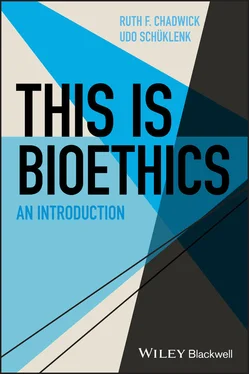1.38 In any case, isn’t it self‐evident that we should act morally? Certainly some philosophers hold that view. With the notable exception of psychopaths most of us do experience bouts of guilt and bad conscience each time we act in a manner that we consider immoral. There might be good evolutionary reasons for this response, too (Katchadourian 2010, 167ff). Most economists will tell you that our actions are driven entirely by self‐interest. And yet, if you look a bit around yourself, you can’t help but notice that many of us engage in actions that don’t seem immediately driven by selfish motives. Tax incentives or no, many of us donate for instance to support charitable causes benefiting people in far‐flung corners of the planet, even though there is no demonstrable pay‐off to us. Just think of Life You Can Safe 20 , an initiative by the Australian philosopher Peter Singer. On the initiative’s website he tells a story 21 of a little girl falling into a pond. Unable to swim, she thrashes about in the water and is about to drown, unless you step in to rescue her. Of course, stepping into the water would wreck your shoes. No doubt most, if not all of us would step into the water to rescue the girl that is struggling for her life, despite the fact that there is no immediate benefit to ourselves, and despite the fact that we would actually incur an inconvenience, possibly even a loss in terms of wrecked clothes. Most of us would do this despite the fact that a legal duty to rescue is not enshrined in the laws of many a country. Singer then goes on to make the point that there is no ethically relevant difference between that girl and another girl that might die a preventable death in a far‐away resource poor country because we have not donated the equivalent dollar amount of a pair of wrecked shoes to an initiative aimed at preventing her death. Life You Can Safe encourages us to volunteer 22 a certain amount of our income to initiatives aimed at preserving such lives.
1.39 Consider a completely different example of altruistic behavior. Claire Aitchison, an Australian academic, clearly somewhat disenchanted with the work climate at her Sydney based university, traveled in 2012 to Bali, an Indonesian island. You might want to read 23 her account of this visit where she writes of her experiences:
Kindness in Bali seems to be a national pastime. I was blown away by the numerous, daily acts of kindness. We were the recipients of so many kindnesses arising from concerns for our welfare, health, enjoyment, comfort and so on; it was almost unnerving. We were invited into people’s homes, to ceremonies at the village temple, we were offered food; the list goes on. Each morning and evening someone came to our house to lay out beautifully constructed offerings to protect us, and the home. It seemed extraordinary that this woman would care so much for the welfare of strangers, but by virtue of coming to the village, we were welcomed into their sphere of kindness, it would seem, without question.
1.40 According to her account the villagers she met engaged in numerous acts of altruistic kindness. The question we are asking here, is, of course, why should they bother doing this to begin with. It turns out to be the case that to many people living an ethical life means living a life that is meaningful to them. A purely egoistic life involving the accumulation of ever more wealth just doesn’t seem to satisfy most of us. To be fair, there are exceptions. Just think of the difference between two billionaires, the late Apple boss Steve Jobs and the investor Warren Buffett. Buffett aims to donate 99 percent 24 of his wealth to charitable causes before his death. Steve Jobs, on the other hand, knowing of his impending death, refused to part with his wealth 25 . Buffett isn’t alone in his quest. To give you just one further example, Charles Feeney 26 gave his interest in a major chain of duty free stores to a charitable organization that he founded. His objective was, as he put it, to use his wealth to ‘help people.’ Since then the charity has disbursed several billion US dollars in a variety of countries. Feeney is proud not to own a house or a car. He travels mostly in economy class and makes a point of wearing a watch not worth more than about 15 US $.
1.41 Well, be these anecdotal cases as they may, it seems true at least for those who can’t find meaning in material wealth alone that living a more ethical life is one possible answer to that all too human yearning for a meaningful life. You might be surprised to learn that many a developed country medical school’s professors leave their comfortable resource rich environments behind to volunteer time in resource poor parts of the world. They volunteer their time and expertise under difficult conditions to help others. Peter Singer observes quite sensibly, ‘If we are looking for a purpose broader than our own interests, something that will allow us to see our lives as possessing significance beyond the narrow confines of our wealth or even our own pleasurable states of consciousness, one obvious solution is to take up the ethical point of view’ (Singer 2011, 293). A good life might only be truly possible for us if we behave morally. Helping strangers could be part of that package.
1.42 Another reason to be ethical appeals ironically to our enlightened self‐interest, so perhaps the economists mentioned earlier were not that far off. It has been suggested that we all would be better off if everyone behaved ethically. There is some truth in this, but it also seems to be the case that this claim can only be correct if many or most people behave ethically, otherwise it is quite likely that in an unjust society those behaving ethically would lose out to the unethical people around them. Perhaps that is one explanation for the enduring popularity of contractualist models in ethics. As we shall see in the next chapter, these are models that rely on us voluntarily agreeing to behave in particular, hopefully ethical ways in our interactions with each other. Contractualism with its appeal to our enlightened self‐interest relies on reciprocity and on our living up to the promises we make to each other. Much more could – and has been – said by way of answering the question why be ethical . If you want to read up on this surprisingly difficult question, you might try Singer (2011, Chapter 12).
1.43 Let us turn now to influential ethical theories that exert significant influence in bioethics. Many books and articles have been published about each of these theories. There is not enough space in this volume to discuss each of these theories at great length. The objective of the subsequent expositions is to flag the main features of these theories as far as they affect reasoning in bioethics; space will also be given to the main criticisms leveled against them. Ideally what you should be able to take away from these expositions is a rough‐and‐tumble idea of what kinds of issues matter with regard to particular ethical theories. You should be able to make use of these features when you aim to analyze particular ethical issues. Be under no misapprehension: you won’t have gained an in‐depth understanding of ethical theory at the end of this book. Pay particular attention to the kinds of issues that are relevant for the purposes of these different approaches. You will find that, looking at the same problem, often but not always different features of the same problem matter to those who advance one or another of these theories. Do keep in mind the two primary objectives of ethics: action guidance and action justification. Ask yourself to what extent the following ethical approaches meet those objectives.
Читать дальше












